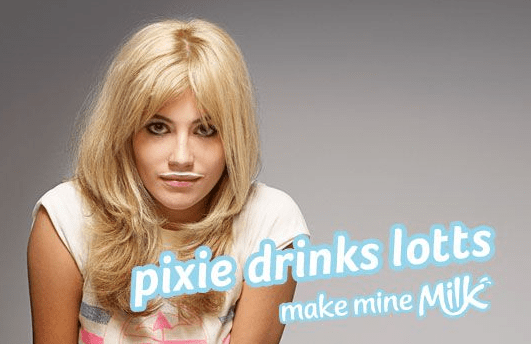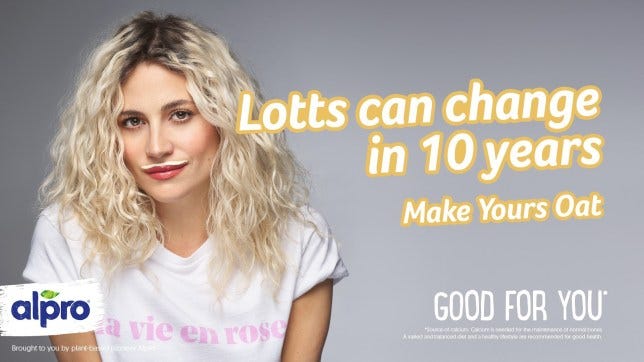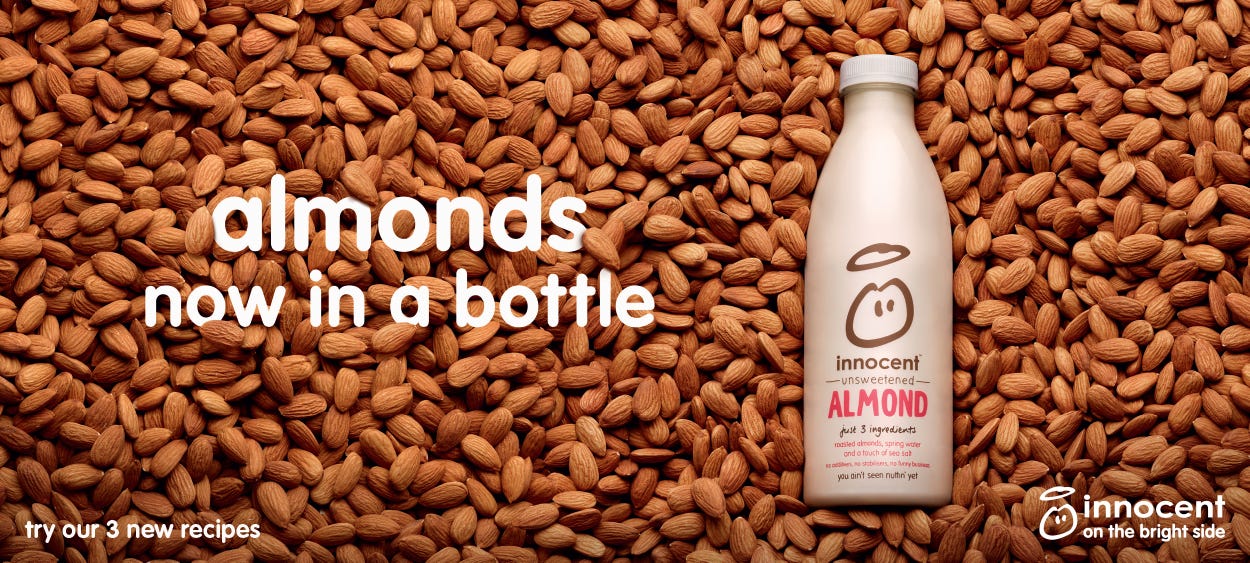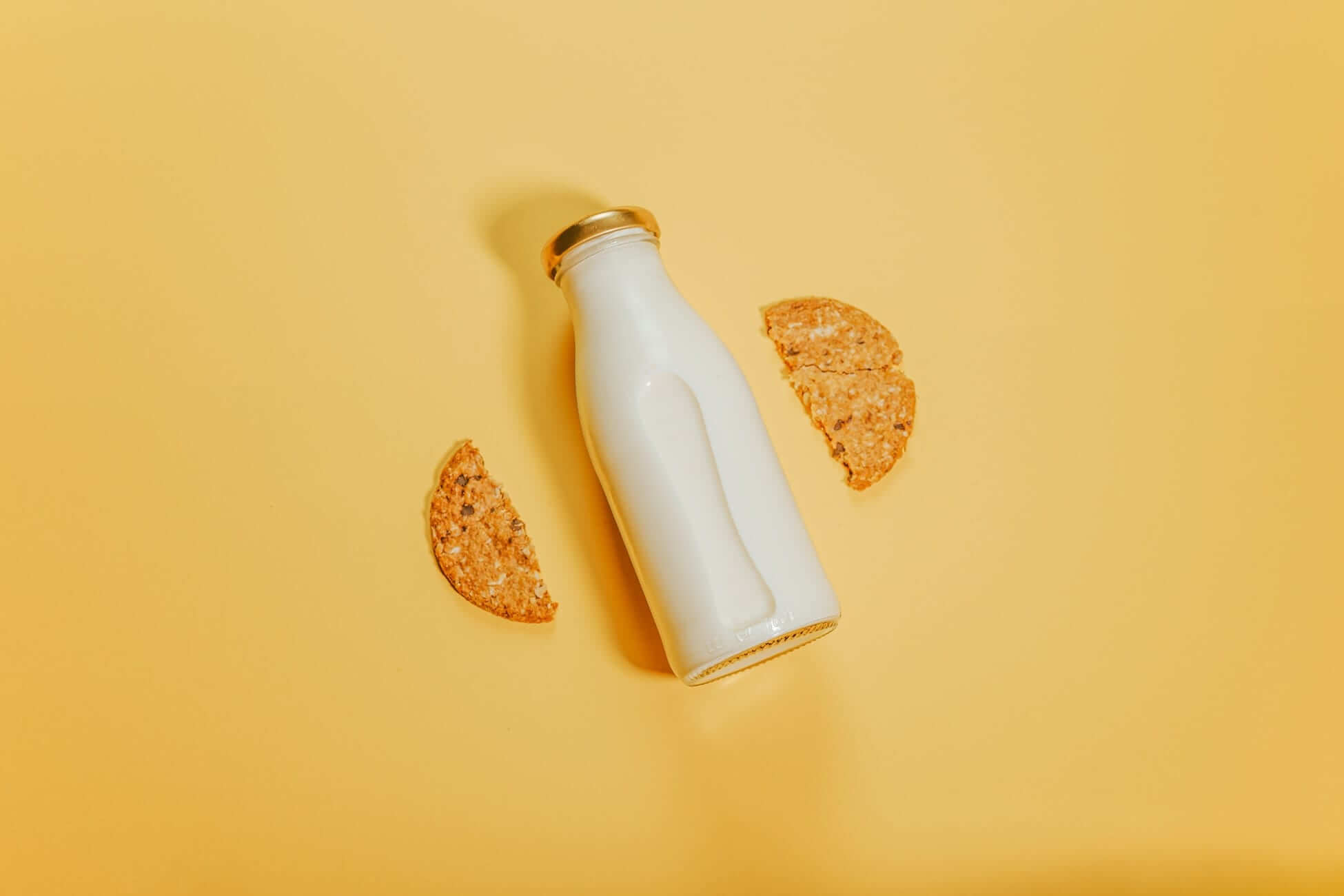Plant-based milk alternatives are more popular now than ever before. Starbucks has soy, coconut, almond, and oat milk at the ready for your morning coffee. Leading plant-based drink brand Oatly has developed a “barista blend” oat milk that steams and froths just like the real thing. Even my grandmother now has almond milk in her tea.
According to Research and Markets, the plant-based milk market is expected to reach US$21.52 billion in 2024, growing at a compound annual growth rate of 10.18% between now and then.
Speciality Food Magazine reports that UK sales of alt-milks were up 28.3% last year, and a third of UK households (32%) now buy dairy-free milk.
Analysis of retail sales data by the Plant Based Foods Association has found that in U.S. grocery stores, sales of plant-based kinds of milk grew 5% over the past year, now making up 14% of milk retail sales. Meanwhile, cow’s milk sales have stagnated, having risen by just 0.1%.
But the rapid rise of plant-based alt-milks from a weird, niche product to a billion-dollar industry hasn’t been driven by a correlating rise in veganism. It has been driven by bold, creative marketing and disruptive transparency.
‘It’s Like Milk, but Made for Humans’
Analysis by Ipsos MORI finds that just 5% of the population identify as vegetarian and 3% either vegan or pescatarian.
However, Google search data, shared by The Economist, suggests that interest in a plant-based diet has surged in recent years across much of the rich world. Since 2015, searches for “veganism” have doubled in America, tripled in Australia, France and Spain, and more than quadrupled in Sweden.
Veganuary — a simple challenge to “try veganism for January”— claims to have inspired and supported more than one million people in 192 countries to try being vegan for January since 2014. Meanwhile, diagnoses of and lactose intolerances are becoming more common (this article from the American Journal of Clinical Nutrition suggests that it affects around 75% of the world’s population).
The most impactful plant-based milk-alternatives have boldly renounced the familiar and presented a rebellious virtuousness in combining innovation with approachable activism. They have captured this increasing awareness of veganism, as well as rising concerns about nutrition and issues such as the environment. This approach has expanded the consumer base of alt-milk brands from a fringe group of vegans to also include individuals with more mainstream diets.
Chas Newkey-Burden writes in The Guardian, “The public is steadily waking up to the fact that the reality of milk production is not a matter of trivial imperfections, of concern only to idealist vegans, but in fact the most dark and wicked part of all farming. And delicious, non-dairy milk, cheese and dessert alternatives are now widely available, so as people learn the truth it is easy for them to ditch dairy for good.”
Many modern consumers are nervous about agricultural use of antibiotics (and in some countries, growth hormones and steroids), and concerned by animal cruelty and the industry’s environmental impact.
As this report submitted to the European Commission finds, “many of the complex relationships between intensive dairy systems and the environmental impact are still not fully understood… [however] In the more intensive systems that dominate dairy production, the main issues are nutrient contamination of soil, groundwater pollution, surface water eutrophication and ammonia emissions.”
Oliver Franklin-Wallis analyses the disruptive influence of plant-based milk products in The Irish Times,
Mr Wallis explains “to converts, almond and oat milk are the next wave in a fundamental shift towards a more conscious, sustainable way of living. To critics, they’re little more than cleverly marketed nut juice with additives … a strange battle has emerged, between an industry trying to replace something it says we don’t need in the first place, and dairy, a business that for a century sold itself as the foundation of a healthy diet, while ignoring the fact that most of the world does just fine without it.”
And our favorite plant-milk brands aren’t messing around, taking advantage of (or, milking) shifting public opinion on these key issues.
The marketing of Oatly appears to take creative influence from graffiti and propaganda-style advertising. The brand places large, bold adverts in unexpected places using clever, simple messaging that captures attention and sparks conversation. The witty, “unpredictable and unrelenting oat punks” (their words), and masterminds behind the “Post Milk Generation,” market their products with very deliberate activism.
Oatly doesn’t over-state facts or associate with the kind of grossly provocative, in your face imagery once associated with veganism (as seen from the likes of PETA), but rather, offer facts, figures, and thought-provoking messaging with artistry. In the UK, the front of every Oatly carton states how much CO2 was produced in producing, packaging, and transporting the product, and the brand has called on the wider food industry to similarly “show us your numbers.”

Strategic communications consultancy Alfred explains how, in bringing Oatly’s now-infamous “its like milk, but for humans” campaign to the UK, they “embraced Oatly’s self-aware tone to wind up the tabloids.”
The campaign was intentionally provocative but not offensive. The controversial statement and tabloid response spread Oatly’s messaging, and Alfred counteracted anticipated negative press with over 125 pieces of coverage — including “weighty features, product placement, influencer content, and trade exclusives” — to strategically drive the debate and generate further attention.
Another popular plant-milk brand, Alpro, generated interest earlier this year with a campaign featuring now-vegan musician Pixie Lott which recreated a dairy industry campaign from ten years ago. Featuring a punny “Lotts can change,” the campaign encapsulated Alpro’s products as almost indistinguishable from the original; but updated for the modern age.


The point is self-evident: change is good, and plant-milk is the better choice. Pixie knows better now.
This spoof of the dairy industry circa 2010 — an almost identical advert featuring the original typeface, background, and of course, advocate — subtly hints at more specifically how plant-based alt-milk is not only more natural (spot the leafy Alpro logo), but also “good for you,” and altogether happier (notice the “la vie en rose” T-shirt) than dairy.
Plant-based milk alternatives have been tactically marketed in these ways to hit the dairy industry’s weak spots.
From Oatly to Alpro to Innocent (as pictured below), the marketing of plant-based milk is clear. It is kinder, greener, and as healthy, if not healthier than its dairy cousins.

Though the latter may be hotly debated, alt-milk brands are frequently highlighting how their products are made from just a handful of simple, nutritious, cow-free ingredients.
With bold, conscientious marketing, the manufacturers of oat, almond, hazelnut, coconut, soy, and hemp milk (and various other dairy-free options) have expanded their reach beyond just vegans.
As Oatly quipped in a recent tweet:
“Hey vegans, non-vegans and normally-not-vegan-but-sometimes-flexie-veggie-person-tarians, we made these oat drinks specifically for you.”
Will the Rise of Plant Milks Continue?
The jury is out on whether dairy has had its day.
Founder of World Plant Milk Day (22nd August), Robbie Lockie, believes so. His website greets visitors with capitalised letters front and centre: “THE FUTURE IS DAIRY FREE.”
However, the analysis (referenced earlier) from Research and Markets is more tentative.
Looking forward, R&M states, “the expansion of the beverage industry, growing obese populace, increasing diabetic population, rapid urbanization, and increasing disposable income are expected to drive the market. However, the growth of the market would be challenged by concerns regarding beverage additives and lack of awareness among people about plant-based beverages.
David Dobbin, chairman of Dairy UK, has reportedly dubbed the drop in demand faced by dairy farmers “a demographic time bomb,” as “younger generations [are] drinking less [dairy] milk than their parents and grandparents.”
For a fairly new and rapidly growing industry, there remain barriers to overcome. Yet one thing is certain; alt-milk is becoming ever-increasingly mainstream.
Taking advantage of increased awareness of veganism, nutrition, and environmental pollutants, the plant-milk industry’s bold but inoffensive approach to activist-led marketing offers a masterclass in expanding a niche consumer base.
According to Research and Markets, the plant-based milk market is expected to reach US$21.52 billion in 2024, growing at a compound annual growth rate of 10.18% between now and then.
Speciality Food Magazine reports that UK sales of alt-milks were up 28.3% last year, and a third of UK households (32%) now buy dairy-free milk.
Analysis of retail sales data by the Plant Based Foods Association has found that in U.S. grocery stores, sales of plant-based kinds of milk grew 5% over the past year, now making up 14% of milk retail sales. Meanwhile, cow’s milk sales have stagnated, having risen by just 0.1%.
But the rapid rise of plant-based alt-milks from a weird, niche product to a billion-dollar industry hasn’t been driven by a correlating rise in veganism. It has been driven by bold, creative marketing and disruptive transparency.
‘It’s Like Milk, but Made for Humans’
Analysis by Ipsos MORI finds that just 5% of the population identify as vegetarian and 3% either vegan or pescatarian.
However, Google search data, shared by The Economist, suggests that interest in a plant-based diet has surged in recent years across much of the rich world. Since 2015, searches for “veganism” have doubled in America, tripled in Australia, France and Spain, and more than quadrupled in Sweden.
Veganuary — a simple challenge to “try veganism for January”— claims to have inspired and supported more than one million people in 192 countries to try being vegan for January since 2014. Meanwhile, diagnoses of and lactose intolerances are becoming more common (this article from the American Journal of Clinical Nutrition suggests that it affects around 75% of the world’s population).
The most impactful plant-based milk-alternatives have boldly renounced the familiar and presented a rebellious virtuousness in combining innovation with approachable activism. They have captured this increasing awareness of veganism, as well as rising concerns about nutrition and issues such as the environment. This approach has expanded the consumer base of alt-milk brands from a fringe group of vegans to also include individuals with more mainstream diets.
Chas Newkey-Burden writes in The Guardian, “The public is steadily waking up to the fact that the reality of milk production is not a matter of trivial imperfections, of concern only to idealist vegans, but in fact the most dark and wicked part of all farming. And delicious, non-dairy milk, cheese and dessert alternatives are now widely available, so as people learn the truth it is easy for them to ditch dairy for good.”
Many modern consumers are nervous about agricultural use of antibiotics (and in some countries, growth hormones and steroids), and concerned by animal cruelty and the industry’s environmental impact.
As this report submitted to the European Commission finds, “many of the complex relationships between intensive dairy systems and the environmental impact are still not fully understood… [however] In the more intensive systems that dominate dairy production, the main issues are nutrient contamination of soil, groundwater pollution, surface water eutrophication and ammonia emissions.”
Oliver Franklin-Wallis analyses the disruptive influence of plant-based milk products in The Irish Times,
Mr Wallis explains “to converts, almond and oat milk are the next wave in a fundamental shift towards a more conscious, sustainable way of living. To critics, they’re little more than cleverly marketed nut juice with additives … a strange battle has emerged, between an industry trying to replace something it says we don’t need in the first place, and dairy, a business that for a century sold itself as the foundation of a healthy diet, while ignoring the fact that most of the world does just fine without it.”
And our favorite plant-milk brands aren’t messing around, taking advantage of (or, milking) shifting public opinion on these key issues.
The marketing of Oatly appears to take creative influence from graffiti and propaganda-style advertising. The brand places large, bold adverts in unexpected places using clever, simple messaging that captures attention and sparks conversation. The witty, “unpredictable and unrelenting oat punks” (their words), and masterminds behind the “Post Milk Generation,” market their products with very deliberate activism.
Oatly doesn’t over-state facts or associate with the kind of grossly provocative, in your face imagery once associated with veganism (as seen from the likes of PETA), but rather, offer facts, figures, and thought-provoking messaging with artistry. In the UK, the front of every Oatly carton states how much CO2 was produced in producing, packaging, and transporting the product, and the brand has called on the wider food industry to similarly “show us your numbers.”

Strategic communications consultancy Alfred explains how, in bringing Oatly’s now-infamous “its like milk, but for humans” campaign to the UK, they “embraced Oatly’s self-aware tone to wind up the tabloids.”
The campaign was intentionally provocative but not offensive. The controversial statement and tabloid response spread Oatly’s messaging, and Alfred counteracted anticipated negative press with over 125 pieces of coverage — including “weighty features, product placement, influencer content, and trade exclusives” — to strategically drive the debate and generate further attention.
Another popular plant-milk brand, Alpro, generated interest earlier this year with a campaign featuring now-vegan musician Pixie Lott which recreated a dairy industry campaign from ten years ago. Featuring a punny “Lotts can change,” the campaign encapsulated Alpro’s products as almost indistinguishable from the original; but updated for the modern age.


The point is self-evident: change is good, and plant-milk is the better choice. Pixie knows better now.
This spoof of the dairy industry circa 2010 — an almost identical advert featuring the original typeface, background, and of course, advocate — subtly hints at more specifically how plant-based alt-milk is not only more natural (spot the leafy Alpro logo), but also “good for you,” and altogether happier (notice the “la vie en rose” T-shirt) than dairy.
Plant-based milk alternatives have been tactically marketed in these ways to hit the dairy industry’s weak spots.
From Oatly to Alpro to Innocent (as pictured below), the marketing of plant-based milk is clear. It is kinder, greener, and as healthy, if not healthier than its dairy cousins.

Though the latter may be hotly debated, alt-milk brands are frequently highlighting how their products are made from just a handful of simple, nutritious, cow-free ingredients.
With bold, conscientious marketing, the manufacturers of oat, almond, hazelnut, coconut, soy, and hemp milk (and various other dairy-free options) have expanded their reach beyond just vegans.
As Oatly quipped in a recent tweet:
“Hey vegans, non-vegans and normally-not-vegan-but-sometimes-flexie-veggie-person-tarians, we made these oat drinks specifically for you.”
Will the Rise of Plant Milks Continue?
The jury is out on whether dairy has had its day.
Founder of World Plant Milk Day (22nd August), Robbie Lockie, believes so. His website greets visitors with capitalised letters front and centre: “THE FUTURE IS DAIRY FREE.”
However, the analysis (referenced earlier) from Research and Markets is more tentative.
Looking forward, R&M states, “the expansion of the beverage industry, growing obese populace, increasing diabetic population, rapid urbanization, and increasing disposable income are expected to drive the market. However, the growth of the market would be challenged by concerns regarding beverage additives and lack of awareness among people about plant-based beverages.
David Dobbin, chairman of Dairy UK, has reportedly dubbed the drop in demand faced by dairy farmers “a demographic time bomb,” as “younger generations [are] drinking less [dairy] milk than their parents and grandparents.”
For a fairly new and rapidly growing industry, there remain barriers to overcome. Yet one thing is certain; alt-milk is becoming ever-increasingly mainstream.
Taking advantage of increased awareness of veganism, nutrition, and environmental pollutants, the plant-milk industry’s bold but inoffensive approach to activist-led marketing offers a masterclass in expanding a niche consumer base.
About the Author
This user submitted article was written by Emily Stubbs.






























